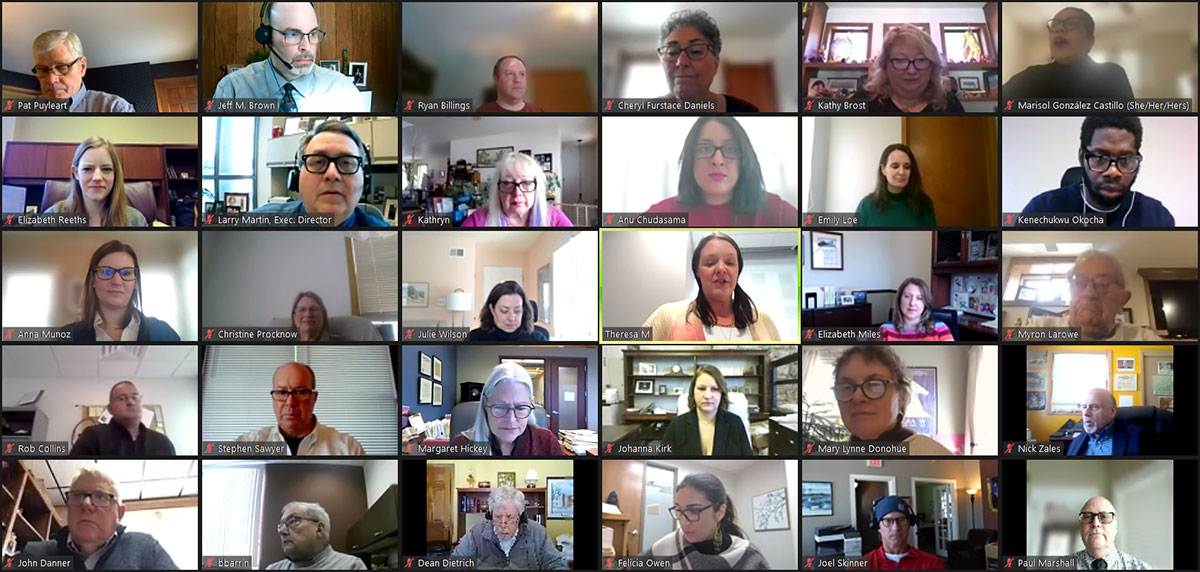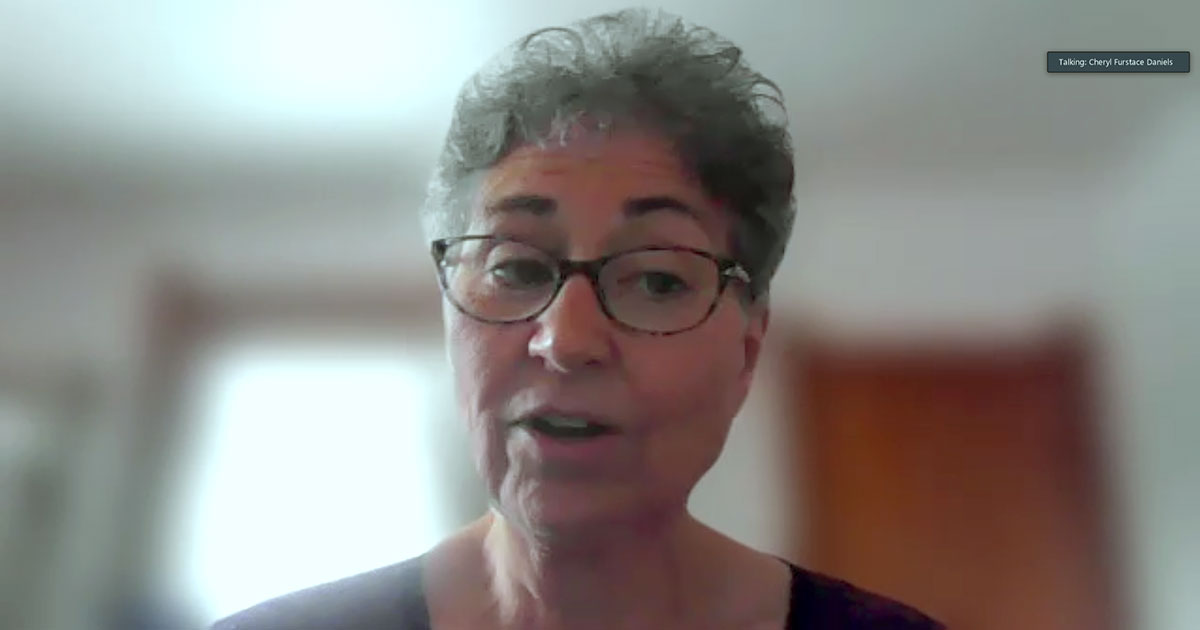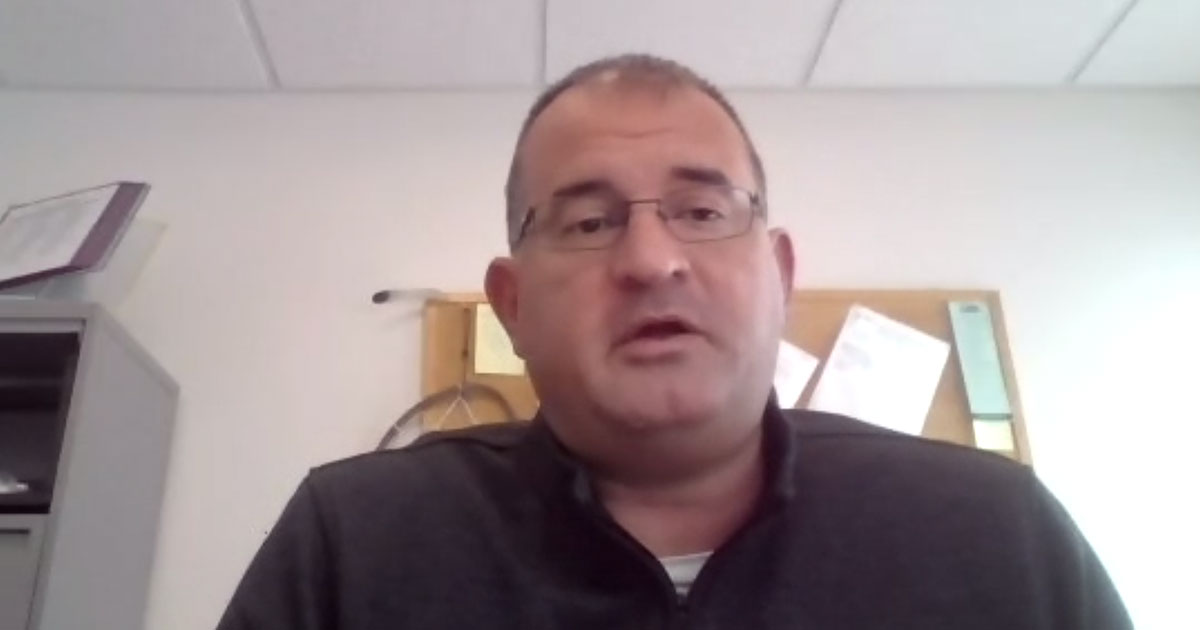
In a meeting via Zoom on Feb. 25, the State Bar Board of Governors considered topics on issues from lawyer well-being, to diversity, equity, and inclusion, and the budget.
Feb. 28, 2022 – The State Bar of Wisconsin’s 52-member Board of Governors recently approved recommendations outlined in a
Racial Justice Task Force Report to cultivate a more diverse and equitable legal system.
The Racial Justice Task Force was formed in 2020 following the officer-involved murder of George Floyd and other deaths of Black Americans at the hands of police officers, which sparked a summer of national, state, and local protests.
The group, formally created by then-president Kathy Brost, was charged with “examining how the strategic planning process can be used to ensure that the State Bar, including its sections, divisions and committees can work toward the goal of racial justice and/or increasing diversity, equity and inclusion in Wisconsin’s legal profession.”
Task Force Chair Jill Kastner, former State Bar president (2019-20), said the group had deep conversations about disparities and racial inequality in the justice system and how it directly conflicts with the State Bar’s mission, vision, and purposes, including its commitment to equal justice under the law.
The board adopted the report with recommendations at its Feb. 25 meeting. The report notes numerous measures that have already been implemented, and other recommendations that are in progress or should be considered.
For instance, the report encourages the State Bar to submit a petition to the Wisconsin Supreme Court to allow attorneys to obtain continuing legal education credit (CLE) for education on diversity, equity, inclusion, and access issues (DEIA). Also on Feb. 25, the board voted to take that step (see below).
Another recommendation encourages the State Bar to bolster collaboration and partnerships with the law schools and other initiatives that support the pipeline to the practice of law for diverse students.
Read the full report.
Board Discusses Proposed FY 2023 Budget
The board discussed, but took no action on, a budget proposal for fiscal year 2023 (July 1, 2022 to June 30, 2023), recommended by the State Bar’s Finance Committee. The committee recommends a $4 dues increase, to $272 for full dues-paying members.
 Jeff M. Brown is a legal writer for the State Bar of Wisconsin, Madison. He can be reached by email or by phone at (608) 250-6126.
Jeff M. Brown is a legal writer for the State Bar of Wisconsin, Madison. He can be reached by email or by phone at (608) 250-6126.
State Bar Chief Financial Officer Paul Marshall said the proposed $12.7 million budget is a solid, workable, and balanced budget that serves well the interests of members, the Wisconsin Supreme Court, and the profession.
“Collectively we have produced a thoughtful guideline for our July 2022 to June 2023 work, in accordance with our strategic plan,” Marshall said.
Marshall said the proposed budget holds the line on expenses while not exceeding State Bar revenues, and it also fully funds the continuation of programs, products, services, and staffing that serve members and the State Bar’s mission.
“In order to reach a balanced budget and in compliance with best practices, the Finance Committee is unanimously recommending a $4 dues increase as part of this budget, which amounts to a little less than a 1.5% increase,” Marshall said.
The last fiscal year allowed the State Bar to boost reserves – a vital component in keeping the organization financially secure long-term, Marshall said.
“Over time, reserves will generate added investment income which will assist in keeping our future dues and dues increases, if and when needed, at a reasonable level.”
Membership dues are separate from Wisconsin Supreme Court assessments and fees, which also appear on the dues statements that will be sent to members in May.
Membership dues account for about 45 percent of the State Bar’s revenue. The other major revenue stream includes sales and registration revenues from State Bar of Wisconsin PINNACLE®, including books, seminars, and conferences.
The State Bar now offers an installment plan to spread dues and assessment payments over six months. In addition, members experiencing financial difficulties can submit a
Hardship Waiver Application.
The board will likely vote on the proposed budget at its April meeting.

State Bar President Cheryl Daniels discusses a proposed petition to the Wisconsin Supreme Court for CLE credits for topics on diversity, equity, inclusion, and access. The motion passed unanimously by the State Bar Board of Governors.
Board Sets Keller Dues Reduction Amount for FY 2023
For FY 2023, the board approved a
Keller dues reduction of $8.25, which full dues-paying members (pro-rated for other member classes) can opt to withhold from their dues. The amount of last year’s reduction was $7.15.
Under
Keller v. State Bar of California,
496 U.S. 1 (1990), and subsequent rulings, mandatory bar associations may use compulsory dues to fund only those activities “necessarily or reasonably related to the purposes of regulating the legal profession or improving the quality of legal services.”
Keller has been codified in Wisconsin SCR
10.03(5)(b)1.
Under
Keller, the State Bar is permitted to fund lobbying and other activities related to these purposes with mandatory dues. But lobbying and other activities not germane to those purposes may not be funded with the compulsory dues of members who object.
Each year, the State Bar calculates a
Keller dues reduction equal to the per-member amount used for activities that may not be funded with mandatory dues. Members who object may withhold the amount from their annual dues.
In 2018, the board adopted a policy to include
all direct state and federal lobbying activity within the
Kellerdues reduction, even that lobbying activity deemed germane to regulating the legal profession or improving the quality of legal services.
The board’s decision to include all direct lobbying activity in the
Keller dues reduction recognizes the concerns of members who object to the use of mandatory dues for any direct lobbying activity, even if permitted under
Keller.
The
Keller dues reduction now includes activities that constitute direct lobbying on policy matters before the Wisconsin Legislature and U.S Congress, “regardless of whether they would otherwise qualify as chargeable under a Wisconsin
Keller dues analysis.”
Board Supports Petition on CLE Credit for Diversity, Equity, Inclusion, and Access
The board unanimously approved its support of a petition that would allow attorneys to obtain CLE credit for programs on diversity, equity, inclusion and access. The State Bar’s CLE Committee drafted the petition, which will now go before the state supreme court.
Attorney Nick Hahn, a member of the DEIA Task Force, told the board that the group will be studying whether DEIA CLE credits should be mandatory. He said that eight states currently mandate DEIA credits and six states have voluntary DEIA CLE credits.
At the last board meeting in December, Lance Leonhard, chair of the CLE Committee, noted that the State Bar should take the lead on DEIA issues.
“As we continue as a society to confront a lot of the issues that are impacted by these topics, specifically access to justice and fair and equal treatment under the law, our profession puts us on the front lines of that work,” Leonhard said. “Better understanding the experience and perspective of others makes us better lawyers.”

Judge Robert Collins of the Oneida Judiciary discusses a petition before the Board of Governors to amend the definition of qualified pro bono programs to include the Oneida guardian ad litem program.
Board Approves Draft Petition on Court Security
The board unanimously approved its support of
petition 21-06, which would update Wisconsin Supreme Court rules to reflect new standards for courthouse construction, renovation, and technology. The petition, which was submitted by the Planning and Policy Advisory Committee, is pending before the Wisconsin Supreme Court.
The petition would also clarify the procedures for collecting data and making reports related to security threats and incidents.
The proposed new rules are necessitated by changes in construction and renovation practices and advances in courtroom technology, according to a supporting memo. Under the current rule, no new courthouse or addition may be occupied until it’s approved by the chief judge of the judicial district.
Board Discusses Adding Oneida Guardian Ad Litem Program to Pro Bono
The board discussed petition 21-08, which would add the Oneida Nation’s guardian ad litem program to the list of qualified pro bono programs under SCR Chapter 31.
Judge Robert Collins with the Oneida Nation drafted the petition. He told the board that while most of the guardian ad litems appearing in the tribe’s courts were community members, some are lawyers. Several of those lawyers have asked to receive CLE credit for their services instead of payment.
The amendment to SCR Chapter 31 made by the proposed petition would allow that, Collins said. The petition now goes before the state supreme court.
Task Force Presents Report on Lawyer Well-being
Judge Todd Bjerke, chair of the State Bar Task Force on Lawyer Well-being, gave an overview of the task force’s Dec. 2021 report. He said the
31-page report, which made 77 recommendations, was the work of seven subcommittees.
Judge Bjerke said that a longstanding stigma surrounding seeking treatment for mental health issues remains a significant barrier to lawyer well-being. He said he hoped the report would help lessen the stigma.
“That’s part of the reason for the task force report,” Judge Bjerke said. “People don’t have to be afraid of that stigma.”
He stressed the importance of seeking help early through programs such as the
Wisconsin Lawyers Assistance Program (WisLAP), which is confidential. “It’s going to affect them sooner or later and they’re not going to be as effective as practitioners.”
State Bar President-elect Margaret Hickey said the stigma of seeking help is often tied up with the legal profession’s culture. “Within our profession, it’s very difficult to admit that you might be struggling with an issue, especially if you’re a litigator – you’re trained not to show your weaknesses,” she said.
“I think the discussion is so incredibly important in changing the culture. I’m confident that our younger lawyers are going to help us with this task. The younger generation has a different view and probably a smarter view about a work-life balance, and so we really need to incorporate younger lawyers into this discussion.”
The board will likely vote on whether to adopt the report with recommendations at its next board meeting in April. Adoption would guide the State Bar’s strategies related to WisLAP and other programs and initiatives related to lawyer well-being.
Members may obtain a copy of the minutes of each meeting of the Board of Governors by contacting State Bar Executive Coordinator
Jan Marksby email or phone at 608-250-6106.
